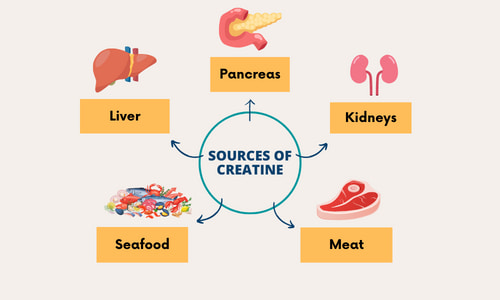Creatine vs Creatinine – What’s the Difference?
“Creatine vs Creatinine – What’s the Difference?” was written by Balbina Herrera & edited/reviewed by Aly Bouzek, MS, RDN. Balbina is a dietetic intern at Larkin University.
Creatine and Creatinine – they sound similar, but they are not the same. In this article, we are going to dive into what they are and how they differ.
Creatine vs Creatinine: What is Creatine?
Creatine is one of your body’s natural sources of energy for muscle contraction and helps your body keep a continued supply of energy for your muscles to do their job.

It is found in seafood, milk, and red meat, or it can be produced by your body.
Creatine is an amino acid that is naturally produced by the liver and kidneys.
It is then transported to your muscles, where it provides them with energy.
Why Take a Creatine Supplement?
*Note, this section includes affiliate links. As an Amazon Associate, I earn from qualifying purchases.
The use of creatine is not recommended for everyone, it is always important to talk to your healthcare provider before taking or introducing any supplements.
Creatine is commonly used by athletes and bodybuilders to enhance their athletic performance. It is also used by those who are involved in “explosive sports.” Explosive sports are those that require you to use quick and explosive energy to reach your goal.
Some examples of explosive sports include:
- Sprinting
- Tennis
- Cycling
- Rowing
- Wrestling
- Football
- Basketball
- Hockey
Creatine supplements come in powders, liquids, capsules, energy bars, drink mixes, tablets, and more. If you have spoken with your doctor and are cleared to take a creatine supplement, then take a look at a few of our product recommendations to get you started.
- Onnit, Creatine Monohydrate
- Klean Athlete Creatine*
- Optimum Nutrition, Micronized Creatine Capsules*
- Transparent Labs, Creatine HMB*
- MyProtein, Creatine Monohydrate*

Benefits of Creatine Supplements
Creatine has potential health benefits, primarily related to its role in muscle function and supporting physical performance.
Let’s take a look at how creatine supplements may benefit your health (1):
- Increase muscle mass and strength (2,3)
- Shorten exercise recovery time
- May help reduce bone loss (3)
- Enhance cognition (specifically in older adults)
Side Effects to Creatine
Creatine is generally considered safe, however, there are possible side effects. Taking higher doses of creatine might increase the chance of experiencing side effects such as:

- Upset stomach: it is common to experience digestive issues, such as cramps or diarrhea
- Dehydration: increase your fluid intake as creatine may cause muscles to hold onto more water, which could lead to dehydration.
- Weight gain: creatine is a supplement that may make you gain weight
- Dizziness
- Muscle cramps, strains, or pulls
- Headache
Precautions When Taking Creatine
Before starting creatine supplementation, it is crucial to talk to a healthcare professional to determine if it is safe for you and if so, for you to get the appropriate dosage and guidance.
Monitor for Side Effects
Be aware of the potential side effects that you can experience when consuming creatine. Some steps that you can take to monitor for side effects include starting with a low dose, and keeping track and noting any change in your body.
Follow Your Recommended Dosage
It is important to consult with your healthcare provider and follow the appropriate recommended dosage. This will allow you to monitor the effects that creatine may have on your body.
Additionally, following the correct dosage of creatine can be helpful if a health concern arises and your doctor needs to know how much creatine supplement you’ve been taking.
Now that we’ve discussed the basics of creatine, let’s dive into creatinine.
Creatine vs Creatinine: What is Creatinine?
Creatinine is a waste product produced by your muscles during metabolism. Your kidneys filter creatinine from the blood, and then it is excreted in your urine.
Creatinine levels can be measured through a blood test. This test can help indicate if there are signs of kidney damage because your kidneys help to get rid of creatinine if they are healthy.
If your kidneys are damaged, they cannot get rid of creatinine as well, and the creatinine level in your blood will rise.
However, it is important to note that even though creatinine is the most widely used source of determining kidney function, it should not be the only factor used.
This is because other factors can influence your creatinine levels, such as how much protein you consume, specific medications, and the amount of muscle mass you have.
For example, your body knows and releases the amount of creatine it needs per day. If your muscle mass is larger (i.e. creatinine is a waste product of muscle), then your body will make more creatinine per day.
Conclusion: Creatine vs Creatinine

Creatine vs creatinine: both creatine and creatinine are related molecules, but play different roles in the body.
Creatine is a natural substance found mainly in muscle tissue and also obtained through dietary sources such as seafood and red meat.
It is taken as a supplement to help improve an athlete’s performance and produce energy for explosive sports such as weightlifting and tennis.
Creatinine, on the other hand, is a waste product as a result of creatine being broken down in the body.
As always, remember to speak with your doctor or registered dietitian before adding a new supplement to your diet.
